 A healthcare worker prepares a dose of the Pfizer-BioNTech COVID-19 vaccine at West Philadelphia High School in Philadelphia, Pennsylvania. (HANNAH BEIER / BLOOMBERG)
A healthcare worker prepares a dose of the Pfizer-BioNTech COVID-19 vaccine at West Philadelphia High School in Philadelphia, Pennsylvania. (HANNAH BEIER / BLOOMBERG)
DUBLIN / LONDON / RABAT / ADDIS ABABA / TUNIS / MOSCOW / STOCKHOLM / BUDAPEST / BERLIN / BRASÍLIA / CAIRO - The US drug regulator on Monday granted full approval to the Pfizer Inc/BioNTech SE COVID-19 vaccine that earned emergency-use authorization in December, making it the first to secure such Food and Drug Administration (FDA) validation as health authorities struggle to win over vaccine skeptics.
The FDA approved the two-dose vaccine for use in people over the age of 16. More than 204 million people in the United States have received the vaccine since it was given emergency authorization, based on data from Sunday.
Public health officials hope it will convince more unvaccinated Americans that Pfizer's shot is safe and effective.
Vaccine hesitancy among some Americans has hindered the United States response to the COVID-19 pandemic.
"While millions of people have already safely received COVID-19 vaccines, we recognize that for some, the FDA approval of a vaccine may now instill additional confidence to get vaccinated," said Janet Woodcock, the FDA's acting commissioner.
Roughly 51 percent of Americans have been fully vaccinated so far, even as a recent surge of infections spurred by the contagious Delta variant ravages parts of the country with low vaccination rates.
The United States has administered 362,657,771 doses of COVID-19 vaccines in the country as of Sunday morning and distributed 428,531,345 doses, the US Centers for Disease Control and Prevention said on Sunday.
More young and healthy unvaccinated pregnant people are ending up hospitalized on ventilators during the delta-fueled spike in cases in the US.
Doctors across the country are reporting this trend, not seen in previous surges, largely in the South but also in states like California and Washington. As of Aug 14, 76.2 percent of pregnant people were unvaccinated.
Pregnant women with COVID-19 are 15 times more likely to die, 14 times more likely to need to be intubated, and 22 times more likely to have pre-term birth than those who are uninfected, according to a study published this month in JAMA Network Open.
Reluctance to get the shots has been widespread among the pregnant population because they were excluded from clinical trials for the Pfizer-BioNTech, Moderna, and Johnson & Johnson vaccines.
WHO
WHO Director-General Tedros Adhanom Ghebreyesus said on Monday that COVID-19 booster shots should be delayed as priority should be given to raising vaccination rates in countries where only 1 percent or 2 percent of the population has been inoculated.
If vaccination rates are not raised globally, stronger variants of the coronavirus could develop and vaccines intended as booster shots should be donated to countries where people have not received their first or second doses, he said during visit to Budapest. World Health Organization (WHO) Director-General Tedros Adhanom Ghebreyesus attends a press conference in Kuwait City, Kuwait, on July 28, 2021. (PHOTO / XINHUA)
World Health Organization (WHO) Director-General Tedros Adhanom Ghebreyesus attends a press conference in Kuwait City, Kuwait, on July 28, 2021. (PHOTO / XINHUA)
Africa
The number of confirmed COVID-19 cases in Africa reached 7,520,393 as of Sunday afternoon, the Africa Centers for Disease Control and Prevention (Africa CDC) said.
The Africa CDC, the specialized healthcare agency of the African Union, said the death toll from the pandemic across the continent stands at 188,654.
Some 6,621,026 patients across the continent have recovered from the disease so far, according to the Africa CDC.
Brazil
Brazilian President Jair Bolsonaro said on Monday that he will ask his health minister to set a date to end the use of face masks as a means of reducing transmission of COVID-19 in Brazil.
Maks have become a political issue in Brazil, with Bolsonaro long ranting against their use and frequently refusing to wear one in public despite a legal requirement to do so.
In the radio interview, the president argued that with much of the population already vaccinated or having caught the virus, masks are not needed.
But epidemiologists say it is too early for such a move, especially due to the rise of the Delta variant in Brazil. Although nearly 60 percent of Brazil's population have received their first dose, only 25 percent are fully vaccinated.
Bolsonaro said he had also commissioned a study into the use of mask wearing with a view to recommending an end to their widespread use.
At over 570,000, Brazil has the world's second highest coronavirus death toll behind only the United States, propelled - according to epidemiologists - by a lack of coordinated national social distancing measures.
Bolsonaro said he hoped a date for ending the widespread use of masks could be set later on Monday.
Any such move could prove to be largely moot, however, with states and municipalities free to set their own COVID-19 restrictions in Brazil. Any federal government position on the matter would likely only function as a guideline, though it would be considered a victory by Bolsonaro's far-right base.
 A senior gets a third shot of the AstraZeneca COVID-19 vaccine during a campaign to give booster shots to the elderly over the age of 86, at the Bicentenario stadium in Santiago, Chile, Aug 11, 2021. (ESTEBAN FELIX / AP)
A senior gets a third shot of the AstraZeneca COVID-19 vaccine during a campaign to give booster shots to the elderly over the age of 86, at the Bicentenario stadium in Santiago, Chile, Aug 11, 2021. (ESTEBAN FELIX / AP)
COVID-19 booster the privilege scientists say will curb Delta
The rollout of a third dose of COVID-19 vaccine has sparked debate on ethical and political grounds, since a large swath of the human population is yet to receive any inoculation. But the case for boosters on scientific grounds is building.
The reason is Delta. The most-infectious coronavirus variant to emerge so far is in a race with the human immune system, and there’s mounting evidence that Delta is winning - at least initially.
Fully vaccinated individuals infected with the variant have peak virus levels in the upper airways as high as those lacking immunity, a large study from the UK showed last week.
That suggests people with Delta-induced breakthrough infections also may be capable of transmitting the virus, frustrating efforts to curb the COVID-19 pandemic.
Waning antibody levels in some highly vaccinated populations such as Israel have prompted calls to offer boosters to blunt fresh waves of hospitalizations.
“The science is the boosters work, and they will definitely help,” said Shane Crotty, a virologist and professor at the La Jolla Institute for Immunology’s Center for Infectious Disease and Vaccine Research in California.
In fully vaccinated, healthy adults, booster shots from Moderna Inc as well as Pfizer Inc and its partner BioNTech SE cause antibodies to rebound to peak levels, if not well beyond, Crotty said in a Zoom interview Friday.
Those antibodies are also likely to be more durable and adept at fighting a wider range of SARS-CoV-2 strains, he said.
People infected with Delta were also found to have significantly higher amounts of virus in their upper airways compared with infections caused by other strains.
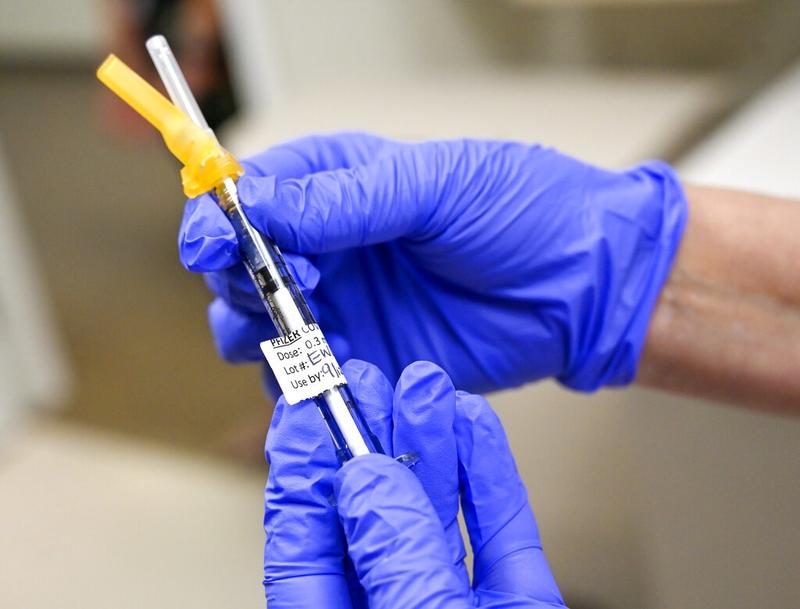 A nurse prepares to administers a Pfizer COVID-19 booster shot on Aug 19, 2021, at UCI Medical Center in Orange, California (JEFF GRITCHEN / THE ORANGE COUNTY REGISTER VIA AP)
A nurse prepares to administers a Pfizer COVID-19 booster shot on Aug 19, 2021, at UCI Medical Center in Orange, California (JEFF GRITCHEN / THE ORANGE COUNTY REGISTER VIA AP)
“It’s inherently tougher to stop with antibodies because there’s more of it and it’s a tougher challenge for the immune system,” Crotty said.
Bolstering antibody levels with an extra dose of vaccine may enable the immune system to swiftly block Delta on its arrival in the nose and throat, preventing the coronavirus from not only infecting cells and causing illness, but also stopping it from spreading, he said.
A slower antibody response, on the other hand, may increase infectiousness and worsen symptoms.
“It’s a race between the virus and your immune system,” Crotty said. The faster the virus replicates, the less time antibodies have to block an infection.
Still, even when a delayed antibody response does lead to infection, immunity generated by either vaccination or a natural infection is usually enough to prevent it causing severe illness in an otherwise healthy person, he said.
Virus particles from Delta-infected individuals are much less likely to be infectious if they’re emitted from fully vaccinated people, researchers in the Netherlands showed in a study released ahead of publication Saturday. Immunized individuals are also infectious for a shorter period compared with those without immunity, reducing the likelihood of onward transmission, research from Singapore last month showed.
It’s possible the infectiousness of vaccinated individuals could be further reduced with third shots using a different inoculation, delivery via a nasal spray, and even with smaller amounts of the same vaccine, Pekosz said.
Denmark
Denmark’s Prime Minister Mette Frederiksen said the country is not likely to see anymore national lockdowns in the future after a very successful vaccine rollout and low contamination figures, she told reporters in Copenhagen on Monday.
The government expects to offer a third vaccine jab at some point and is currently investigating at what time the extra inoculation makes sense.
Separately, the government said it will spend as much as 800 million kroner (US$125 million) to help Bavarian Nordic A/S finance its COVID-19 vaccine candidate.
“It has shown really good results so far,” Health Minister Magnus Heunickesaid in a Copenhagen press briefing on Monday. The vaccine is expected to be approved “early next year,” he said.
In another development, Denmark will begin the routine testing of wastewater treatment plants in October to serve as an early warning system for a resurgence of the virus, newspaper Jyllands-Posten reported. The 200 sites will cover 90-95 percent of the country’s population.
Egypt
Egypt will vaccinate all 4.5 million of its state employees against COVID-19 in August and September as it seeks to accelerate vaccinations ahead of a likely fourth wave of infections, the health minister said on Monday.
The country's infection rate is still low but started to increase last week and the upward curve is expected to continue for a while, Hala Zayed told a briefing, adding that a significant increase is expected in late September.
"It is important for the Egyptian government and the political leadership that we work to intensify vaccinations in the coming period," Zayed said.
As part of the program, all workers in pre-university education, university employees and university students - a total of more than 5 million people - will be vaccinated before the start of the academic year in October, she said.
So far, about 10 million people out of Egypt's population of just over 100 million have registered online to get vaccinated and nearly 7.5 million have received at least one dose, Zayed said.
Egypt has received millions of doses of COVID-19 vaccines produced by AstraZeneca, Sinopharm, Sinovac, Sputnik, and Johnson & Johnson.
It has also produced 15 million doses of Sinovac's vaccine locally, Zayed said, and will receive about 5.2 million doses produced by Pfizer and Moderna in September.
The country plans to have 800 vaccine centers running by the end of August, up from 657 currently.
Egypt has recorded 286,352 COVID-19 infections as of Sunday, including 16,674 deaths. However, officials and experts say the real number of infections is far higher but is not reflected in government figures because of low coronavirus testing rates and the exclusion of private test results.
Ethiopia
Ethiopia registered 785 new COVID-19 cases in the past 24 hours, taking the nationwide tally to 295,804 as of Sunday evening, the country's Ministry of Health said.
The ministry reported eight new deaths and 880 more recoveries during the same period, bringing the national death toll to 4,561 and total recoveries to 269,132.
The country currently has 22,109 active COVID-19 cases with 484 under severe health conditions, according to the ministry.
Germany
Daily COVID-19 infections in Germany continued to rise as 3,668 new cases were registered within one day, 1,542 more than one week ago, the Robert Koch Institute (RKI) announced on Monday.
The country's seven-day incidence rate, which already climbed above 50 over the weekend, went up to 56.4 per 100,000 people on Monday, according to RKI, the federal government agency for disease control and prevention. A week ago, the seven-day coronavirus case rate was still 36.2.
Health Minister Jens Spahn told German public television broadcasters ARD and ZDF on Monday that it was "outdated" to impose stricter COVID-19 measures on the basis of an incidence of 50 or higher. Hospitalization figures should become the new reference before the national elections in September, he said.
On Monday, 87 new hospitalized COVID-19 cases were reported in German hospitals, meaning that the seven-day incidence rate of hospitalized cases in the country stood at 1.28 cases per 100,000 residents, RKI data showed.
Global tally
Coronavirus cases worldwide surpassed 211.81 million while the global death toll topped 4.43 million, according to data compiled by Johns Hopkins University.
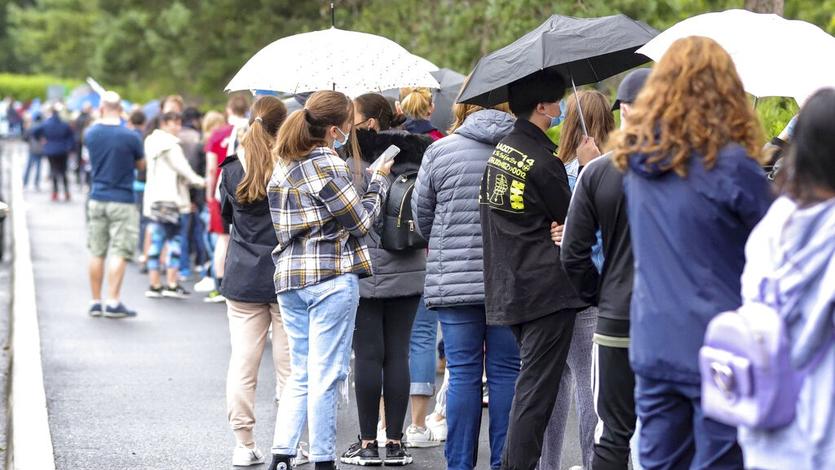 Parents and their children queue in rain outside the Citywest vaccination center, in Dublin on Aug 14, 2021. (DAMIEN STORAN / PA VIA AP)
Parents and their children queue in rain outside the Citywest vaccination center, in Dublin on Aug 14, 2021. (DAMIEN STORAN / PA VIA AP)
Ireland
The level of COVID-19 hospitalization in Ireland reached a multi-month high on Sunday despite a decline in daily cases.
The Irish Department of Health said that as of Sunday morning there were 314 COVID-19 patients being treated in hospitals across the country, of which 59 were in intensive care units.
A total of 1,688 new cases were also confirmed on Sunday in the country, a 20-percent decline from Saturday's 2,125 cases, the highest daily figure ever recorded since the current wave of infections reached the country in July.
Paul Reid, head of the Health Service Executive, an Irish state agency responsible for the public health service, told local media that the 314-hospitalization figure was the highest since the end of March this year.
Earlier in the day, he tweeted that almost 6.6 million doses of vaccines have been administered in Ireland and 85 percent of Irish adults have been fully vaccinated.
Reid also urged people to follow the public health advices as the COVID-19 threat in the country "is still very real."
The current wave of infections in Ireland started in mid-July when the country saw its daily cases soared above 1,000 for the first time in many months.
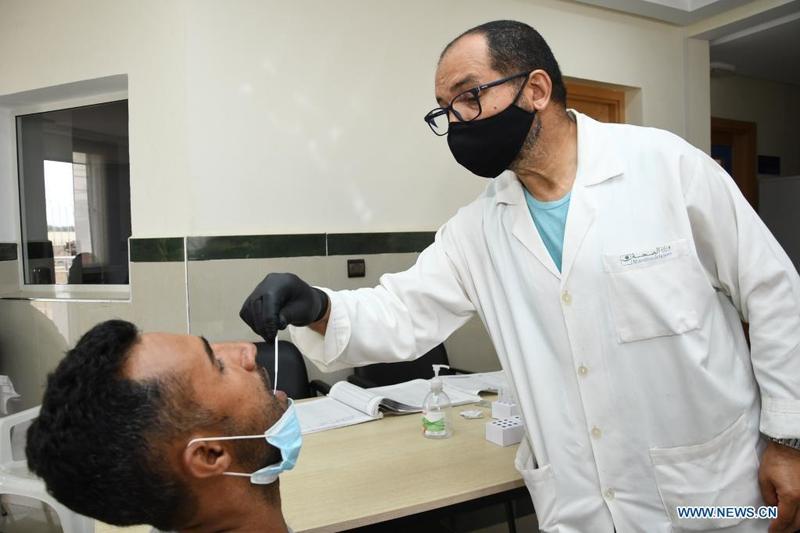 A medical worker takes a swab sample from a man for a COVID-19 test in Tiflet, Morocco, on Aug 3, 2021. (CHADI / XINHUA)
A medical worker takes a swab sample from a man for a COVID-19 test in Tiflet, Morocco, on Aug 3, 2021. (CHADI / XINHUA)
Morocco
Morocco announced on Sunday 4,661 new COVID-19 cases, taking the tally of infections in the North African country to 810,949.
The death toll rose to 11,792 with 115 new fatalities, while 2,467 people are in intensive care units.
ALSO READ: WHO: Ebola, COVID-19 risk straining W. Africa health systems
Russia
Russia reported 19,454 new COVID-19 cases on Monday, the first time the daily tally has dipped below 20,000 since June 23 as authorities blamed a case surge on the infectious Delta variant.
The government coronavirus task force also reported 776 coronavirus-related deaths in the last 24 hours nationwide.
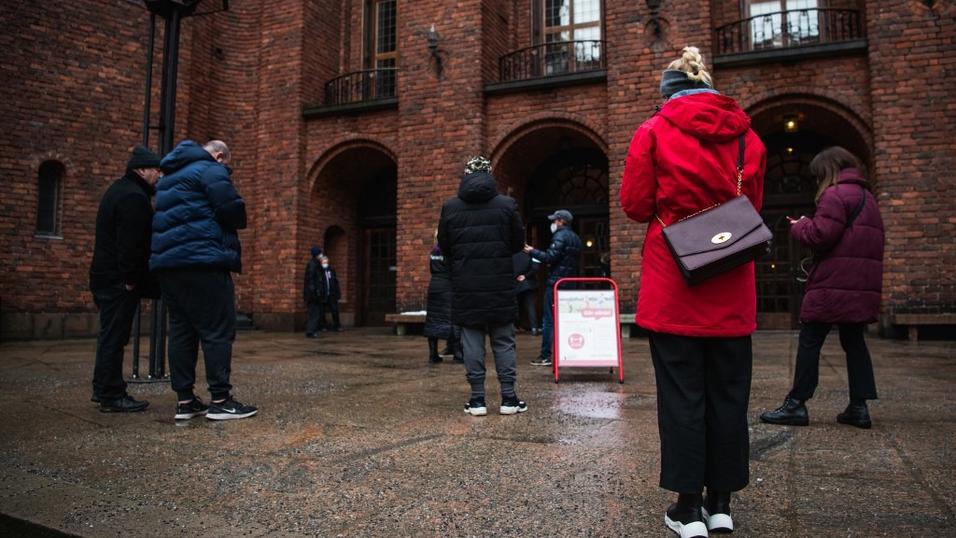 People wait for their turn to enter Stockholm's City Hall, known as venue for the Nobel Prize banquets and converted now into a COVID-19 vaccination center for a day on Feb 21, 2021 in the capital of Sweden, amid the COVID-19 pandemic. (JONATHAN NACKSTRAND / AFP)
People wait for their turn to enter Stockholm's City Hall, known as venue for the Nobel Prize banquets and converted now into a COVID-19 vaccination center for a day on Feb 21, 2021 in the capital of Sweden, amid the COVID-19 pandemic. (JONATHAN NACKSTRAND / AFP)
Sweden
Sweden is likely to see COVID-19 infections gain momentum in the coming months while the current curbs to limit the spread will need to be maintained until a higher proportion of the adult population is vaccinated, the Health Agency said on Monday.
Sweden, which has opted against lockdowns and mostly relied on voluntary measures, has experienced a lull in the pandemic during the summer with few deaths and hospitalisations. However, cases have risen in recent weeks and that trend is expected to continue as schools reopen and people return to work.
"All our three scenarios point to increased spread during the autumn," the Health Agency said in a statement. "More people are assumed to need hospital and intensive care, but at significantly lower levels than before during the pandemic."
While infections have been lower during summer, the rapid spread of the highly infectious Delta variant has seen authorities urge Swedes to remain on their guard, especially as colder weather forces people indoors.
It said that current restrictions and recommendations, mainly to limit social interactions, isolate if sick and work from home if possible, should be kept in place until more people had received COVID-19 jabs. Around 65 percent of the adult population is fully vaccinated.
"When the vaccination coverage rate is high enough so that healthcare does not risk being overloaded the Public Health Agency considers it reasonable to phase out most infection control measures, despite a spread of the virus," it said.
Sweden has seen significantly higher deaths per capita than its Nordic neighbors during the pandemic but lower than in most European countries.
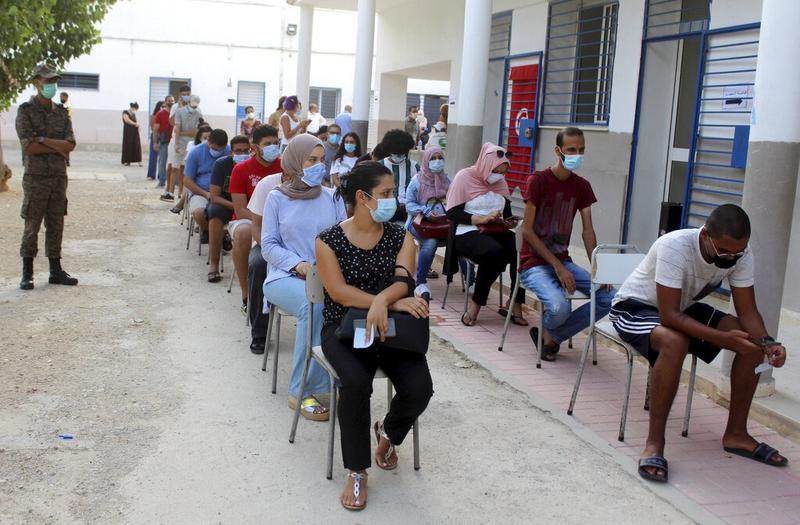 Resident queue to be vaccinated with the Moderna COVID-19 vaccine at the Assad Iben El Fourat school in Oued Ellil, outside Tunis on Aug 15, 2021. (HASSENE DRIDI / AP)
Resident queue to be vaccinated with the Moderna COVID-19 vaccine at the Assad Iben El Fourat school in Oued Ellil, outside Tunis on Aug 15, 2021. (HASSENE DRIDI / AP)
Tunisia
Tunisian Health Ministry on Sunday reported 2,825 new COVID-19 cases, raising the tally of cases in the North African country to 640,897.
The death toll from the virus rose by 17 to 22,537 in Tunisia.
UK
The UK has agreed to buy 35 million more doses of the Pfizer-BioNTech COVID-19 vaccine, to be delivered from the second half of next year, as part of its preparations for booster shots and any new variants that could emerge.
"While we continue to build this wall of defense from COVID-19, it's also vital we do everything we can to protect the country for the future too – whether that's from the virus as we know it or new variants," Health Minister Sajid Javid said.
In another development, almost a fifth of companies advertising COVID-19 tests for travelers returning to the UK from abroad face removal from the government’s list of providers over misleading prices, the health department said.
Some 82 private travel testing companies will be issued a two-strike warning and could be removed from the government’s website, Javid said in an emailed statement.
Javid earlier this month asked the UK’s competition watchdog to probe testing companies in order to help stamp out any “exploitative behavior” by rogue firms. Monday’s action marks a clamp-down on “cowboy” practices, Javid said. His department said that as part of the ongoing review, “regular spot checks will be introduced from this week to make sure companies are complying with the rules.”
The GOV.UK site will also be updated this week to reflect the true cost of travel tests this week, it said. Fifty-seven companies will be removed from the list because they no longer exist or don’t provide relevant services.
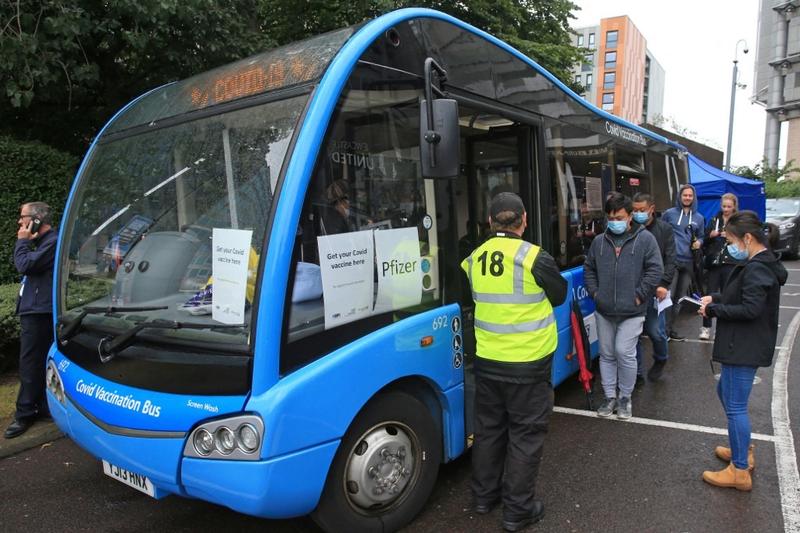 People queue to receive a dose of the Pfizer/BioNTech COVID-19 vaccine at a mobile vaccination center set up in a bus parked outside Premier League club Newcastle United's St James's Park football stadium in Newcastle, north east England on Aug 15, 2021. (LINDSEY PARNABY / AFP)
People queue to receive a dose of the Pfizer/BioNTech COVID-19 vaccine at a mobile vaccination center set up in a bus parked outside Premier League club Newcastle United's St James's Park football stadium in Newcastle, north east England on Aug 15, 2021. (LINDSEY PARNABY / AFP)
People returning to England from a countries deemed at lower risk must take a COVID-19 test before departure and book a test for day two after arrival. People headed to and from the UK by air spent at least 380 million pounds (US$520 million) on tests in the first six months of the year, based on a Bloomberg analysis of passenger traffic data from the Civil Aviation Authority and London Heathrow airport.
ALSO READ: UK to track virus variants with genomic sequencing across world
Another 32,253 people in Britain have tested positive for COVID-19, bringing the total number of coronavirus cases in the country to 6,492,906, according to official figures released Sunday.
The country also reported another 49 coronavirus-related deaths. The total number of coronavirus-related deaths in Britain now stands at 131,640. These figures only include the deaths of people who died within 28 days of their first positive test.


